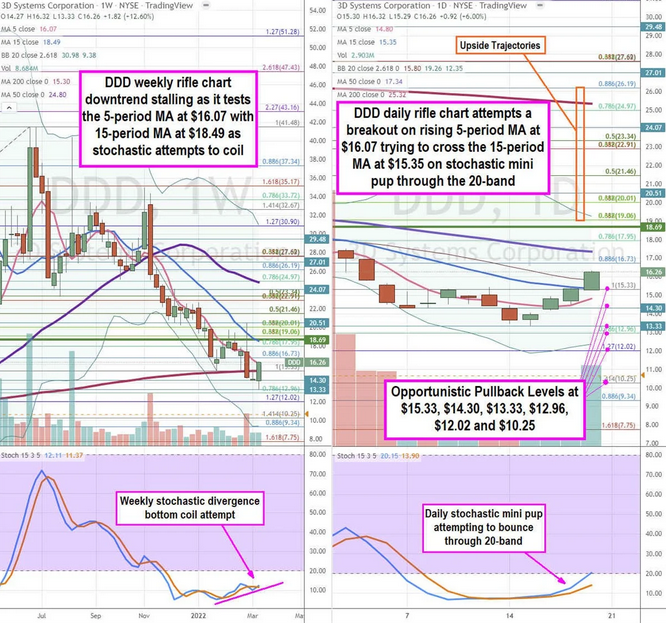3D printing and digital manufacturing solutions provider 3D Systems (NYSE:DDD) stock has sold-off over (-60%) from its pandemic high of $56.50. The maker of 3D printing systems has seen growing mainstream adaption of the technology from the aerospace, automotive, electronics, manufacturing, industrial to the healthcare industries. The Company is embarked on regenerative medicine, 3D bioprinting, and industrial solutions. The Company has emerged from 2021 with a number of acquisitions to expand its footprint and solution offerings including real-time component process simulation company Additive Works, and cloud-based manufacturing operating system Oqton. 3D systems also made acquisitions to bolster its regenerative medicine offerings with Volumetric and Allevi. The Company has a partnership with United Therapeutics (NASDAQ:UTHR) to “ultimately manufacture an unlimited supply of human organs for transplantation, beginning with the human lung to meet the needs of critically ill patients around the world”, according to CEO Dr. Peter Graves. Prudent investors looking for exposure in the cutting edge 3D printing segment notably in bioprinting can watch for opportunistic pullbacks in shares of 3D Systems.
Q4 Fiscal 2021 Earnings Release
On Feb. 28, 2021, 3D Systems released its fourth-quarter fiscal 2021 earnings report for the period ended in December 2021. The Company reported a profit of $0.09 per share versus consensus analyst estimates for a profit of $0.03 per share, a $0.06 per share beat. Revenues fell (-12.6%) year-over-year (YoY) to $150.9 million, beating consensus estimates by $143.93 million. The Company announced the agreements to acquire Titan Robotics and Kumovis, which adds extrusion-based technology to its portfolio to support Healthcare and Industrial solutions. The Company completed a $460 million convertible bond issuance at 0%. 3D Systems ended 2021 with $789.7 million in cash. 3D Systems CEO Dr. Jeffrey Graves commented:
“2021 was a remarkable year for 3D Systems. In the face of a difficult operating environment, we executed well against our four-phased strategy that we introduced in the summer of 2020. As a result, we exited 2021 as one of the largest and the most profitable pure-play additive manufacturing companies in the world, entering 2022 with great momentum, an extremely strong balance sheet, and focused on investing for the exciting growth we see ahead.”
In-Line Guidance
The Company issued in-line guidance for fiscal full-year 2022 revenues to come in between $570 million to $630 million versus $575.55 million consensus analyst estimates. The Company expects full-year 2022 non-GAAP gross margins between 40% to 44% and non-GAAP operating expenses between $225 million and $250 million.
Conference Call Takeaways
CEO Graves stated that the Company would immediately suspend all sales to Russia due to the invasion of Ukraine. The Company transformed in 2021 refocus and reorganize into two business units, Healthcare, and Industrial Solutions. This was methodical process took 18-months to optimize, divest and restructure to gain and optimize efficiencies. CEO Graves described:
“As we closed out the year, the results clearly spoke for themselves. When adjusted for divestitures of noncore assets, our results for 2021 not only dwarfed our 2020 performance, but also significantly surpassed 2019 across all key financial metrics from top line growth to profitability and cash flow. From a balance sheet perspective, our combination of operating performance and sale of noncore assets allowed us to add over $0.5 billion to the balance sheet by the end of our third quarter.“
By the end of 2021, the Company released 3 powder bed printing systems including a dual laser version of its top-selling single laser system, the DMP350 dual metal-based printer. Its productivity is expanding its opportunities notably in the healthcare segment. Additionally, the Company its largest offering of new materials spanning all of its polymer technology platforms. CEO Graves explained:
“This expertise in polymeric materials technology is a key differentiator for our company in the marketplace and an important sustainable competitive advantage.”
The Company boosted its software offerings by acquiring Additive Works, which enables real-time process simulation for new components production and cloud-based manufacturing operating system Oqton.

DDD Opportunistic Price Levels
Using the rifle charts on the weekly and daily time frames provides a precision view of the landscape for DDD stock. The weekly rifle chart coiled off its 200-period moving average (MA) support at $15.30 to peak near the $22.91 Fibonacci (fib) level before resuming its downtrend before coiling off its lows at $13.33. The weekly downtrend is being tested at the 5-period MA resistance at $16.07 with the 15-period MA at $18.49 following lower. The weekly 50-period MA sits at $24.80 and weekly lower Bollinger Bands (BBs) at $9.38. The weekly stochastic is forming a divergence bottom as it attempts to coil back up at the 10-band. The weekly market structure low (MSL) buy triggers on a breakout through the $18.69 level. The daily rifle chart downtrend is potentially reversing into a breakout with the rising 5-period MA at $14.80 trying to crossover the 15-period MA at $15.35 as the stochastic attempts a daily mini pup through the 20-band. The daily 50-period MA sits at $17.34 and 200-period MA sits above the daily upper BBs at $19.26 at $25.32.Prudent investors can look for opportunistic pullback levels at the $15.33 fib, $14.30, $13.33, $12.96 fib, $12.02 fib, and the $10.25 fib level. Upside trajectories sit at the $19.06 fib level up towards the $26.19 fib level.
